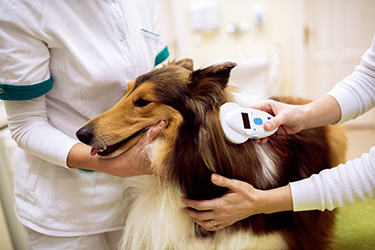National Pet ID Week 2018

National Pet ID Week runs April 15-21. How will you encourage compliance and celebrate in your practice?
The ASPCA estimates approximately 6.5 million companion animals (3.3 million dogs and 3.2 million cats) enter shelters each year, while the American Humane Association estimates more than 10 million dogs and cats are lost or stolen annually. Sadly, only about 710,000 animals that enter shelters as strays are returned to their owners. Of those, 620,000 are dogs and only 90,000 are cats.
In honor of National Pet ID Week, April 15-21, consider some ways to promote identification compliance and encourage microchipping to your clients to ensure their beloved pets always make it back home.
Can I see some ID?
Encourage your clients to outfit their pet’s collar with visible identification with their contact information. Even indoor pets should have a collar with ID, as they can slip outside unnoticed or during emergencies or natural disasters. This safety precaution costs very little but can make all the difference, especially if traveling or vacationing with pets.
Make sure all identification is on the pet’s collar, and the collar remains on the pet at all times. The ASPCA reports that while 80 percent of pet owners believe in the importance of animal wearing ID tags, only 33 percent always have ID tags on their pets. Along with the pet’s name, owner’s phone number and address, encourage clients to add, “I’m microchipped!” on the pet’s ID tag.
If you don’t sell tags in your office, consider sharing information about Tags for Hope. In addition to a pet tag, clients can purchase a wallet ID card with their pet’s information on it. Proceeds from each Tags for Hope purchase helps provide food, treatment and shelter for animals in need. Local licensing or rabies vaccination tags also can help to identify missing pets.
Microchipping and technological advancements for tracking lost pets
Microchipping is the most effective method to track missing pets, especially if a collar is lost or removed. The American Veterinary Medical Association’s official position states, “The AVMA endorses the use of electronic identification in animals and supports the standardization in materials, procedures, equipment and registries. Veterinarians are thereby encouraged to recommend the use of electronic identification of animals to their clients.”
The AVMA goes on to state, “The implementation of a global system of animal identification has the potential to eliminate geographical boundaries that might interfere with animal recovery.”
The ASPCA’s position on pet identification supports microchip identification along with a collar and personalized ID tag for companion animals.
Remind clients that microchipping provides the best method to track missing pets, especially if a collar is lost or removed. There are many microchipping brands available.
According to the AVMA, “A study of more than 7,700 stray animals at animal shelters showed that dogs without microchips were returned to their owners 21.9 percent of the time, whereas microchipped dogs were returned to their owners 52.2 percent of the time. Cats without microchips were reunited with their owners only 1.8 percent of the time, whereas microchipped cats went back home 38.5 percent of the time.”
The app, Finding Rover, offers another method for tracking lost or missing pets, as well.
Profit potential of microchipping within your practice
To encourage compliance, consider offering microchipping as an additional service for your clients. Upfront costs include a universal scanner and the implantable chips. Practices can charge an initial implantation fee and a separate registration fee. Some chips require annual registration fees, while others are a one-time charge. Covetrus carries several types of microchips and microchipping supplies.
Don’t forget to remind pet owners that they must register the microchipped number with the national database for the microchip to be effective. Sadly, many people think that a microchip is enough. If the number is not registered and routinely updated with current contact information, the number is virtually useless. Scan each pet during routine office visits to ensure owner information is up to date or use the opportunity to promote your microchipping service.
Partner with a local shelter or rescue group and host a public microchipping clinic. You may receive marketing exposure through advertisements in your local community paper, press releases, and radio or TV public service announcements.
Sources
https://www.aspca.org/animal-homelessness/shelter-intake-and-surrender/pet-statistics
https://www.aspca.org/about-us/press-releases/do-your-pets-wear-id-tag-they-should
https://www.petfinder.com/dogs/lost-and-found-dogs/why-microchip/
https://www.aaha.org/pet_owner/pet_health_library/general_health_care/microchipping/default.aspx
Need Regulatory Assistance
If you need help with regulatory or licensing issues, we're happy to help. We have a wide variety of resources to help you when issues arise.

Careers
Are you looking for a place to let your talents shine? At Covetrus, we help our practitioner customers better serve their patients and take pride in providing the best customer experience possible. Search our open positions to see our available opportunities.
Newsletter
Stay current with what’s going on with Covetrus, subscribe to receive our newsletter and email communications. Subscribers will receive the latest information in practice management, sales and marketing, animal health, and more.


Leave a comment